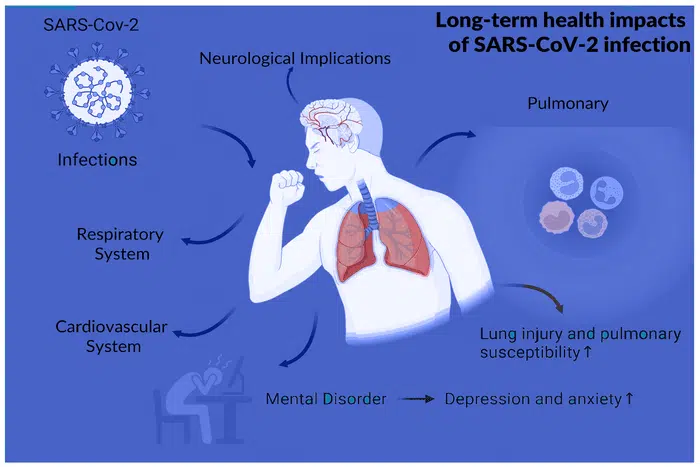Long-term health impacts of SARS-CoV-2 infection

The global impact of the SARS-CoV-2 virus, responsible for the COVID-19 pandemic, has been immense. While much has been discussed about the immediate symptoms and preventive measures, there is a growing concern about the long-term health impacts of the infection.
As the SARS-CoV-2 virus evolves, the right research tools become critical for understanding transmission, mutations, and immunity. As a leading supplier of essential medical and lab testing products, HHC strives relentlessly to address this need.
In this article, our experts throw light on the negative effects this deadly virus can have in the long term.
Understanding Long-Term Health Impacts
SARS-CoV-2 infection can lead to lasting health issues, commonly called “long COVID.” These may include persistent fatigue, difficulty concentrating (often called “brain fog”), shortness of breath, and joint pain. Long COVID can harm different organs and cause symptoms for weeks or months after the first infection.
Respiratory System:
One of the most studied long-term impacts has been on respiratory function. SARS-CoV-2 is a respiratory virus that primarily attacks the lungs during initial infection.
More than half of the hospitalised patients still had damaged tissue in their chest three months after leaving.
Common and persistent symptoms include fatigue, dyspnea, chest pain, and cough. Pulmonary function tests also revealed impaired gas transfer and decreased exercise tolerance among post-COVID patients.
The virus appears to trigger inflammatory and fibrotic changes in lung tissue that do not easily resolve. Scar tissue replaces healthy lung tissue, reducing oxygen intake and carbon dioxide output. These respiratory issues are even more pronounced for patients requiring mechanical ventilation or intensive care during hospitalisation.
While vaccination can protect against severe lung disease, even milder initial infections can result in measurably reduced lung function. Continued problems like shortness of breath and cough likely impair the overall quality of life for those infected.
Cardiovascular System:
SARS-CoV-2 can also damage cardiac tissue and the vascular system. Research suggests that the virus may induce heart muscle inflammation, a condition known as myocarditis. Possible long-term effects: higher chance of heart problems like heart failure and irregular heartbeats. Additionally, small clots throughout blood vessels can block circulation, causing injury.
Recent studies tracking recovered patients show many continue exhibiting myocardial inflammation, arrhythmias, and reduced pumping capacity months later, regardless of severity. After the acute infection, platelets stay hyperreactive, affecting the blood’s clotting ability. This increases the risk of heart attack and stroke after COVID.
Neurological Implications:
SARS-CoV-2 has also been associated with neurological symptoms like loss of taste/smell, headaches, dizziness, and cognitive impairment.
MRI scans of infected patients show changes in brain structure, including thinner cortex, tissue damage, and small bleeds.
Neuroinflammation, impaired blood-brain barrier function, hypercoagulation, and neurodegeneration may underlie these effects.
Certain groups, like older people and those with risk factors like obesity, seem particularly vulnerable. More longitudinal research is required to clarify if these neurological impacts plateau or progress over time. Understanding how SARS-CoV-2 can affect the nervous system is important as new variants keep appearing.
Kidney Injury:
Kidney problems can occur early in COVID-19, but long-term damage is seen even after recovery. Autopsies have revealed persistent inflammation and scarring in the kidney tissue of deceased patients. Lab tests show continually elevated levels of protein in urine along with reduced kidney function in survivors, indicative of chronic injury.
Kidney issues, such as glomerulosclerosis and tubular necrosis, may be caused by the specific disease process of SARS-CoV-2. Characteristics like direct cellular invasion, microvascular injury, and oxygen deprivation allow the virus to harm nephrons in the renal system extensively.
Mental Health Impacts
Severe COVID-19 infection, isolation, and uncertain futures greatly affect mental health. Anxiety, depression, sleep disorders and PTSD have been highly prevalent among recovered patients in numerous studies. Social isolation, loneliness, and bereavement losses during the pandemic also feed into mood disorders. Those with pre-existing mental health conditions have experienced worsening symptoms, and some recovering mild COVID-19 cases have newly presented with psychiatric illness as well.
Conclusion:
In the face of the continually changing COVID-19 pandemic, it is crucial to recognise and tackle the enduring health consequences of the SARS-CoV-2 infection.
By staying informed and seeking comprehensive support, individuals can pave the way for a healthier, more resilient future after this global health crisis.
As the SARS-CoV-2 virus evolves, the right research tools are critical for understanding transmission, mutations, and immunity.
At HHC, we have a collection of viral samples, reagents, and controls to provide scientists, laboratories, and test manufacturers with high-quality materials to support essential research and test validation.
We offer an array of SARS-CoV-2 positive and negative controls, isolates, viral lysates, and cultured samples. These include heat-inactivated SARS-CoV-2 culture fluid, COVID-19 positive and negative serum panels, and more. We have reliable materials if you need clinical samples to evaluate diagnostic assays, viral isolates to study evolutionary trends or other prepared reagents.
As with any infection, having access to the right lab materials is imperative. Over the past three years, scientists and test makers have relied on our COVID-19 supplies to accelerate their work. Purchase confidently, knowing our products undergo the most rigorous quality testing and documentation. We are committed to supporting the global public health response by equipping laboratories with the tools needed to combat SARS-CoV-2.
To know how HHC helps labs across continents develop better solutions for public health improvement, call us now!
To learn more about our products, please visit our website: https://www.h-h-c.com.
